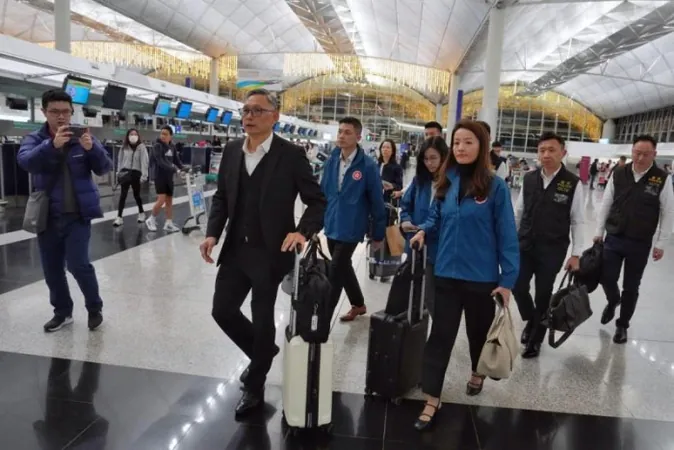
Is Hong Kong's New Task Force in Thailand the Key to Stopping 'High-Paying' Job Scams?
2025-01-13
Author: Ying
In a proactive bid to combat the rising number of high-paying job scams luring Hong Kongers to Southeast Asia, security officials from Hong Kong have launched a task force in Thailand. The initiative comes in light of a disturbing spike in missing person reports linked to these scams, prompting lawmakers to stress the urgency of the situation.
Security legislator Gary Chan Hak-kan emphasized that the task force's deployment follows a worrying trend of disappearances and pleas for help from families of victims. A recent high-profile rescue, including mainland Chinese actor Wang Xing, has brought the issue of human trafficking to the forefront.
Led by Undersecretary for Security Michael Cheuk Hau-yip, the task force arrived in Bangkok with a clear agenda: meetings with Thai officials and representatives from the Chinese embassy, particularly focusing on the local anti-human trafficking committee. Chan remarked that the success of this diplomatic mission lies not only in assisting current victims but also in raising awareness among Hongkongers, reminding them to critically evaluate job offers that seem too good to be true.
The task force is designed to enhance coordination between different agencies, including the Economic and Trade Office in Bangkok, which has been criticized for lacking the necessary political influence and security expertise. Chan noted that the task force, comprising officials from the Immigration Department and the police, would provide much-needed support in tackling these complex situations.
Lai Tung-kok, another legislator and former security minister, praised this diplomatic effort as a significant step towards combatting these scams. He underscored the importance of continuous education on the risks associated with such job offers, indicating a commitment to preventing further incidents.
Recent statistics are alarming: between 2022 and early 2023, Hong Kong's government responded to 46 appeals from residents trapped in Myanmar and Cambodia. The victims were reportedly promised lucrative jobs and basic accommodation, only to find their passports confiscated and their freedom stripped away. Once ensnared, they were coerced into working in scam operations, often under armed guard, with no means of escape.
Cheuk revealed that criminal enterprises have shifted their tactics, with perpetrators now misleading victims into believing they are traveling to safer destinations like Taiwan or Japan, only to reroute them to perilous conditions in Southeast Asia. He warned residents against traveling near the borders of Thailand, Myanmar, and Laos, citing the treacherous environments in these regions.
In December, Secretary for Security Chris Tang Ping-keung reported that 23 Hongkongers were trapped in these dangerous situations in Southeast Asia at the start of 2024. As of this past Sunday, the number has risen to 28, with 12 individuals still unaccounted for. While some victims reported restrictions on their movement, they maintained communication with family and officials, providing some hope of eventual recovery.
With the Hong Kong task force now in Thailand, there is renewed hope that combined efforts in diplomacy, education, and enforcement can shield local residents from these insidious scams. If you or someone you know is considering a job offer in Southeast Asia, think twice—your future might just depend on it!




 Brasil (PT)
Brasil (PT)
 Canada (EN)
Canada (EN)
 Chile (ES)
Chile (ES)
 Česko (CS)
Česko (CS)
 대한민국 (KO)
대한민국 (KO)
 España (ES)
España (ES)
 France (FR)
France (FR)
 Hong Kong (EN)
Hong Kong (EN)
 Italia (IT)
Italia (IT)
 日本 (JA)
日本 (JA)
 Magyarország (HU)
Magyarország (HU)
 Norge (NO)
Norge (NO)
 Polska (PL)
Polska (PL)
 Schweiz (DE)
Schweiz (DE)
 Singapore (EN)
Singapore (EN)
 Sverige (SV)
Sverige (SV)
 Suomi (FI)
Suomi (FI)
 Türkiye (TR)
Türkiye (TR)
 الإمارات العربية المتحدة (AR)
الإمارات العربية المتحدة (AR)